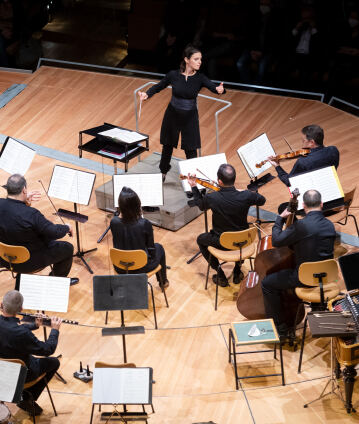“Late Night” concert with Oksana Lyniv

She was the first woman on the podium of the Bayreuth Festival: the Ukrainian conductor Oksana Lyniv made her acclaimed debut at the world-renowned festival in summer of 2021. She learned her trade thoroughly, including as Kirill Petrenko’s assistant at the Bayerische Staatsoper. She presents in this Late Night concert together with members of the Berliner Philharmoniker works by Igor Stravinsky.
Without question, there is no danger of boredom in the works of Igor Stravinsky. This is also due to the fact that the Russian constantly reinvented himself stylistically. After the legendary successes of his works written for the Ballets Russes between 1911 and 1914, he broke completely new ground.
What is usually referred to as Stravinsky’s “Neoclassical Period” emerged – as the composer told his close confidant Robert Craft – from a “look into the past” that also turned out to be a “look in the mirror”. The works conducted by Oksana Lyniv in this concert also show this dual character: while the instrumentation of the octet for flute, clarinet and two each of bassoons, trumpets and trombones is historically without precedent, the form represents an original adaptation of classical models. The middle movement, for example, is a mixture of a series of variations and a rondo. In contrast, the composer expressly understood the E-flat major concerto “Dumbarton Oaks”, written in 1938 for an American couple, as a homage to Johann Sebastian Bach’s Brandenburg Concertos. On the one hand, Stravinsky overwrites the Baroque model with irregular rhythms and “quirky” harmonies; on the other, the similarity extends to quotation, as evidenced by the opening motif, which directly refers back to the first movement of Bach’s Third Concerto.
The first performance of the short ballet-burlesque Renard by the Berliner Philharmoniker as part of the Berliner Festwochen in 1964 was conducted by Stravinsky himself, who was already over 80 years old. The libretto, set in the animal world, is based on Russian folk tales and tells of the cruel punishment that the titular fox reaps for his ruthless scheming. First performed by the Ballets Russes in 1922, Stravinsky completed the work as early as 1916. The frugal instrumentation for four male voices and chamber orchestra, in which the use of the cymbalon provides a very special sound, is explained by the later abandoned plan to perform the piece at the famous Salon de Polignac in Paris.
© 2021 Berlin Phil Media GmbH
Related interview
Category
Artists
Our recommendations
- “Late Night” concert with Patricia Kopatchinskaja
- “Late Night” concert with Jörg Widmann
- “Late Night” concert with Simon Rattle and Magdalena Kožená
- “Late Night” concert with Pierre-Laurent Aimard
- Schubert’s “Winterreise” with Christian Elsner and Simon Rattle
- “Late Night” concert with François-Xavier Roth